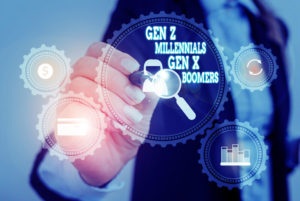A recent Becker’s article got me thinking about generational differences at work. Scott Becker wrote the article, “Working with younger generations – 7 thoughts”, focusing on millennials and Gen-Z. He acknowledged that if you label entire generations with broad cliches you may not understand any real differences or similarities between generations. He noted that the state of the economy when you graduate can influence your view on work and career the rest of your life. He goes on to comment on work-life balance, social consciousness, job hopping, tech savviness, and mental health. I encourage you to check out the article.
acknowledged that if you label entire generations with broad cliches you may not understand any real differences or similarities between generations. He noted that the state of the economy when you graduate can influence your view on work and career the rest of your life. He goes on to comment on work-life balance, social consciousness, job hopping, tech savviness, and mental health. I encourage you to check out the article.
I am passionate about developing next generation leaders and spend a lot of time informally mentoring and advising people as well as providing both leadership and career coaching services. As a baby boomer, the “next generation” for me includes Gen X (born 1965-1980), Millennials (born 1981-1996), and Gen Z (born 1997-2012). And then there is that micro-generation called Xennials born in the late 1970s or early 1980s. That is where my two daughters and their husbands fall – I can see how they aren’t quite Gen X or Millennials when I think about the general labels. Xennials are described as having an analog childhood and a digital young adulthood.
I have decades of experience to draw on in leading and teaching others, but I also consider myself a continual learner and learn every day from the generations coming behind me. The book “Wisdom @ Work, The Making of a Modern Elder” by Chip Conley is an excellent resource. As the description says, “The secret to thriving as a midlife worker: learning to marry wisdom and experience with curiosity, a beginner’s mind, and a willingness to evolve, all hallmarks of the “Modern Elder.”
On a lighter note, the idea of generational differences and having a beginner’s mind reminds me of the movie, “The Intern”, starring Robert DeNiro and Anne Hathaway. DeNiro is a 70-year-old widower who had a successful career but is bored with retirement and signs on as an intern. He develops an unlikely friendship with the workaholic CEO played by Hathaway. It becomes a mutually beneficial relationship with both learning and growing in new ways.
What’s my “so what” on generational differences at work?
- When trying to understand someone, generational influence can serve as a broad framework but should not limit or constrict your view of them
- Leaders must understand each individual’s unique personality, what they can contribute, and what motivates them regardless of their generation
- We all learn from one another and need to have a natural curiosity and openness to change at any age
Remember that others helped you along the way to get to where you are – be sure to pay it forward!
Related Posts:
Developing next generation leaders 2021 style
